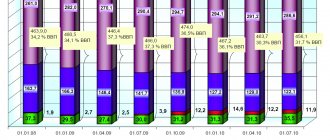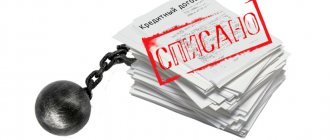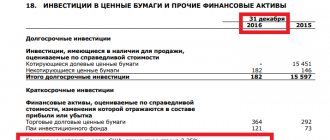Where to begin
It is clear that not all debtors who are in difficult life circumstances can pay off the debt immediately.
Let's consider at what point and how you can agree with the bailiffs to pay off the debt in installments. You have received a notice from the bailiff service. Usually there is a clear indication of the name of the bailiff who is handling your case, telephone number and working hours. The first thing to do is call him, introduce yourself and arrange a meeting. If the name of the specialist is not indicated, then you need to call the bailiff service and find out which of the inspectors is dealing with your issue.
If you pay the bailiffs little by little, they will not describe the property
According to the content of paragraph 12 of Art. 30 of the Federal Law “On Enforcement Proceedings” the period for voluntary fulfillment of requirements is five days from the date of receipt of the resolution. Thus, if the debt to the bank amounts to hundreds of thousands of rubles, as reflected in the writ of execution, then the debtor is obliged to deposit exactly this amount into the account of the bailiffs. But if the debtor could not pay the loan, then naturally he will not be able to fulfill the bailiff’s demand at a time.
In practice, there are cases when debtors do not expect the visit of the bailiffs and do not prepare for it in any way (or they themselves make serious mistakes by coming to the department in personal transport). The situation is the seizure of a pledged car. The collectors, together with the bailiffs, lured the debtor to the bailiff service department. After the debtor got out of the car, the sly men blocked the car with two others. The debtor left the department and saw what was happening. Naturally, trying to save the collateral property and keep it in use did not work out.
We recommend reading: Where the insert is sewn into the work book sample
Is it possible to negotiate with bailiffs on installment payment?
There are options to avoid describing property. But in fact, the FSSP does not have the right to make such decisions independently. All issues regarding deferment are resolved through the court.
It would also be useful to find out whether it is possible to pay the debt to the bailiffs in parts and what the size of these parts is. The debtor has the right to determine the duration of the installment plan himself or to develop a plan together with other interested parties. But the main thing is that it is approved by the court. At the same time, the creditor retains the right to appeal the adopted installment plan. Likewise, the debtor has the right to challenge the plan drawn up and proposed by the creditor.
If you pay the bailiffs monthly
When credit debts are submitted for enforcement, the borrowers-debtors no longer communicate with bank employees, but with bailiffs. And here many people have a question: “How not to pay a debt to the bailiffs?” The Federal Law “On Enforcement Proceedings” provides a scope of powers to apply enforcement measures, including foreclosure on the property and income of the debtor.
This is interesting: Is it possible to pay rent through government services if the apartment is located in another city
Today, after activating the card, I discovered that instead of 6000 there is minus 14900. After calling SSP, it turned out that the account was seized due to a writ of execution (my topic is about this writ of execution). and the next 2-3 months. everything that is credited will be debited from the account.
Powers of bailiffs
Now let's figure out who bailiffs are, what their powers are, what articles of the law they are guided by and, in general, whether a bailiff can give installments to pay a debt.
There is a law “On Bailiffs” No. 118-FZ of July 21, 1997, which clearly and clearly describes the powers of bailiffs.
Based on this, it becomes clear that the servant of the law has the right to seize all your accounts, deprive you of half your salary, and auction off the property that belongs to you.
He may even use physical force when resisting in the performance of his official duties.
Therefore, to the question: is it possible to agree with the bailiffs on the phased payment of the loan debt, we will definitely answer yes.
How much can you pay bailiffs?
Federal Law No. 229 – no more than 50% of salary, pension, scholarship, and other income. If the debt is for alimony, compensation for injury to health, or compensation for damage as a result of a crime, then bailiffs can regularly collect up to 70% of income until the obligations are fully repaid.
The procedure for forced collection from the debtor of monetary obligations occurs only at the moment when the court has satisfied the claims of the credit organization to collect the debt under the loan agreement. But a court decision or court order alone is not enough to begin enforcement proceedings; the conditions established by law must be met:
How and where to contact
Art. 434 of the Code of Civil Procedure reflects how to negotiate with bailiffs in order to pay the debt in installments and that the debtor has the right to such relief. However, as of 2020, neither the Code nor the Federal Law “On Enforcement Proceedings” provides a specific list of reasons according to which a citizen will be allowed to change the payment procedure.
These circumstances include:
- lack of stable income;
- the need to use available funds to pay for other needs (treatment);
- the need to travel abroad due to the illness (death) of close relatives;
- impossibility of withdrawing funds from a bank account due to certain reasons;
- the appearance of dependents in the family;
- wages are too low, etc.
To obtain an installment plan, you must go to court
There must be compelling circumstances supported by documentation. Falsification is not allowed, since then the bailiffs will not be able to obtain an installment plan on the writ of execution.
https://www.youtube.com/watch{q}v=4kEiuDB1VLg
We suggest you read: Is it possible to refuse an inheritance and take it back later?
In order to receive a deferment (installment plan) in accordance with the above or other reasons, you can go in two ways:
- After receiving notification from the bailiffs about the need to pay for existing obligations, the debtor has 5 days to take any action. He can pay the debt, enter into negotiations with the creditor to conclude a settlement agreement, or apply for a deferment to the court at his place of registration or to the court that issued the collection order. The application must reflect information about the writ of execution, state your point of view, attach a list of documents confirming the existence of a difficult life situation and express a request for a deferment or installment payment. Moreover, the debtor has the right, along with the application, to attach a plan according to which he will be able to pay his debts. After this, a court hearing is scheduled, at which all interested parties must be present: the debtor, the collector, the bailiff. Based on the results of the meeting, the court will make a decision on granting (not granting) a deferred (installment) payment.
- The second option is not to go to court yourself. If the debtor really does not have property and available funds (neither cash nor on a card), the bailiff himself can apply to the court with a request to defer payments. This significantly increases the chance of court approval.
But on the other hand, the bailiff is not obliged to do this, and instead of going to court, he can describe the debtor’s property (if he has it) or issue a writ of execution stating the impossibility of collecting any funds from the defaulter, due to the latter’s lack of material assets . And this will be a possible reason for initiating bankruptcy proceedings.
If you pay the bailiffs little by little, they will not describe the property
If any of the indicated persons refuses to sign the act (inventory), an appropriate note is made in it (it). 7. Copies of the bailiff’s order to seize the debtor’s property, the act of seizure of the debtor’s property (inventory of property), if compiled, are sent to the parties to the enforcement proceedings, as well as to a bank or other credit organization, a professional participant in the securities market , to the registering authority, the debtor, the owner of state or municipal property, other interested parties no later than the day following the day the resolution was issued or the act was drawn up, and in case of seizure of property - immediately.
The most proven option is to have sales receipts with the name of the other owner. If you try hard, you can find such checks. How to behave with bailiffs If representatives of the service do come to your home, talk to them politely. Don't give up on debt. You take a position: I’m very sorry that everything turned out this way, as soon as I can, I’ll pay everything.
How to communicate with performers
So, you have made an appointment with your specialist. But before you go to see him, make a conversation plan. Think about how to negotiate with bailiffs on payment in installments.
First, describe the situation that gave rise to the debt itself. Collect documents confirming your precarious financial situation.
It can be:
- salary certificate from the place of work;
- presence of dependents;
- utility bills;
- certificate of illness;
- medicine bills, doctor's fees and more.
It should be remembered that bailiffs are people too, and among them there are quite adequate specialists. It is also beneficial for them that they do not have to search for the client and do not need to describe his property, which must be sold in order to return the money to the creditor.
If you come to him with a detailed plan to resolve the issue and make at least some contribution under the writ of execution, it is likely that the specialist will meet you halfway and decide on what schedule to pay the money in installments, towards the debt.
You may offer to pay off your debt in regular weekly or monthly payments without being able to pay off the amount in full. You are more likely to get a favorable decision from the bailiff if it is realistic and affordable.
We suggest you read: Deductions from pensions by bailiffs
Before you make your offer, figure out what you can afford and create a budget sheet to show the money you'll be able to pay toward the debt. For example, you can pay 1000 rubles per month after paying other important expenses such as food, utilities, mortgage and energy bills.
Before visiting the inspector, you can write an application to the accounting department of the enterprise at your place of work for a partial monthly transfer of wages to pay off the debt. Make a copy of it and show it to the bailiff.
Don't offer to pay more than you can afford. You'll make your situation significantly worse if you can't keep up with your promised payments. By doing this, you will only let down the inspector, who entered into the client’s plight and allowed the debt to be paid in stages.
I pay 500 rubles for enforcement proceedings
The enforcement fee is added to the amount of obligations upon expiration of the five-day period for voluntary repayment of the debt. Other expenses are added upon delivery. How to pay bailiffs less on debt? The only way not to increase the debt, but to gradually reduce it, is not to hide from the bailiffs, so that they do not spend money on the search. The longer you “run” from the bailiffs, the more the amount of expenses for search activities, correspondence, requests to various authorities increases.
We recommend reading: What are the privileges of a young family in Volgograd?
According to the claim, he owes 180,000 thousand. The bailiffs initiated proceedings based on the writ of execution. I have no property, and no official income either. what if I pay 500 rubles a month? Along with the topic “Proceedings based on a writ of execution,” they are also searching for: Urgent legal consultation free of charge 8 800 505-91-11
What to do if the court refuses installments and deferment
The current legislation does not provide a specific list of reasons according to which certain concessions can be obtained. This means that this issue is resolved at the request of interested parties by each individual court. That is, the civil court (as the first instance) can reject the corresponding request of the debtor, and a higher authority, when filing an appeal, can satisfy it.

The court may not always approve a deferment of payments
One of the possible options is to negotiate with the creditor to conclude a settlement agreement. As a rule, a bank (housing and communal services or any other organization) agrees to an agreement only if it is beneficial to it. For example, if this is the case, there is a greater chance of returning the funds transferred to the lender under the loan.

In this case, the creditor may agree to make payments in installments, defer their completion, and write off part of the penalties and fines accrued during the delay. At the same time, in the case of a mortgage, the bank will certainly prefer to return the collateral property (apartment). The practice is that only a few such trials end in a settlement agreement. If no agreement has been reached with anyone, the only option is to seize the property by a bailiff and its further sale.
Attention! Due to recent changes in legislation, the legal information in this article may be out of date!
Our lawyer can advise you free of charge - write your question in the form below:
Free consultation with a lawyer
Request a call back
Still have questions {q}
Call the number and our lawyer will answer all your questions for FREE
Whether the bailiffs will give an installment plan or not - only the judge will decide. The legislation provides for the possibility of this if there are force majeure circumstances that currently do not allow the entire debt to be fully repaid.
Combine all loans into one! Reduce overpayment and monthly payment! Refinance
If the court decides that the borrower’s financial situation is not so difficult, it may refuse the installment plan. In this case, it will not be possible to agree with the bailiffs on an installment plan for the loan, and they will seize the property in order to force it to be sold to pay off the debt. The debtor will be prohibited from traveling abroad, and if he has official income, part of it will be withheld.
We invite you to read: Tax deduction for dental treatment
How much can be withheld from a pension{q} From a pension can be withheld amounts that do not exceed 50% of the monthly receipts to the debtor’s card/account.

After the court decision has entered into force, bailiffs begin enforcement. What percentage of salary can be withheld{q} According to the legislation of the Russian Federation, up to half of the salary can be withheld. This is the maximum possible part. The lien will continue until the amount of the debt specified in the judgment is paid in full. The percentage of wage deductions can be reduced through legal action.
A seizure is placed on the salary card (account) so that the borrower cannot withdraw wages after they have been received. It is used to pay the salary for the loan. Then the bank, on the basis of a court order, withholds the portion indicated in the document and transfers it to pay off the debt using the specified details.
Installment plan under a settlement agreement
In order to prevent the initiation of enforcement proceedings, even at the stage of legal proceedings, the borrower can try to negotiate with the lender on the provision of installment plans for loan obligations. This method is implemented by concluding a settlement agreement between the parties on the basis of Article 39 of the Code of Civil Procedure of Russia. And if enforcement proceedings have already been opened, then, guided by Article 50 of Federal Law No. 229, the debtor and creditor can also apply to the court to approve the settlement agreement. If the participants reach conditions that suit everyone and do not violate anyone’s interests, the court will approve such an agreement.
Useful information on bailiffs
Who can get a deferment or installment plan
If it was not possible to agree with the bailiff on repaying the debt in installments, then you need to go to court, which made a decision to collect the debt from you in favor of the creditor. There is Article 434 of the Code of Civil Procedure of the Russian Federation, according to which you have a chance for a satisfactory outcome of the case.
The court application must indicate:
- the date of the court order to collect the debt from you;
- amount of debt;
- identify the parties in this case;
- write in detail about the circumstances due to which the debt to the creditor arose;
- debt repayment terms and feasible payment schedule.
The application must be accompanied by certificates and documents indicating a difficult financial situation. During the consideration of the application, the court makes a decision to grant an installment plan for the debt under the writ of execution by court decision, or to refuse it.
If the court makes a negative decision on the application submitted by you due to insufficient justification, then compulsory debt collection measures will be applied to you.
Let us remind you that in this case the performers have the right:
- Seize property that belongs to you.
- Seize 50% of wages.
- Seize all your accounts and seize funds from them to pay off the debt.
And yet, you should thoroughly study the article “Property that cannot be levied under enforcement documents” under No. 446 of the Code of Civil Procedure of the Russian Federation.
If your civil rights are violated, feel free to write complaints against the bailiffs to all authorities provided for by law.
If the court makes a positive decision for you, your main duty is to honestly comply with the payment schedules and amounts. The second time the court decision will not be in your favor.
If you pay the bailiffs little by little, they will not describe the property
If for some reason it is not possible to return the money, and the creditor goes to court and wins the case, then the bailiffs can impose a penalty on the defaulter’s accounts, his salary and property, including an apartment, house, dacha, car. But before we continue, let's define the terminology. For the purposes of this publication, we will use the terms “credit” and “creditor” to mean debt obligations in the broad sense, and not just legal relationships arising from contracts with banks and other financial institutions.
If the borrower understands in advance that the amount of the debt is too large to be repaid in full, then it is strictly not recommended to wait for the bailiffs to visit in order to agree with them on an installment payment, as this will only waste time. The correct way is to appeal to the judicial authority, which made a decision to collect the debt in favor of the creditor. The debtor must draw up an application requesting the opportunity to pay the debt in installments. This right is provided for in Art. 434 Code of Civil Procedure of the Russian Federation. Moreover, it is better to do this immediately after receiving the decision to initiate enforcement proceedings, before the five-day period for voluntary execution has expired.
Consequences of going to court
Based on the results of the meeting, a decision may be made to satisfy the request for deferment (installment plan) or dissatisfaction. In the first case, the effect of the writ of execution on the need to collect money from the debtor is frozen until the latter violates the obligations imposed on him by the court.
https://www.youtube.com/watch{q}v=AGkR0Gc1aWA
If the request is not granted, the writs of execution will continue to be in force and the bailiff will describe and then confiscate the debtor’s property necessary to pay his obligations.
If you pay the bailiffs little by little, they will not describe the property
The bailiff is intimidating with an inventory of property - does he have the right if I don’t hide and pay little by little?
Hello. Foreclosure of the debtor's property (inventory of property) in your case can be applied by the bailiff when carrying out the collection. Federal law;

What to write in the application
Based on Article 434 of the Code of Civil Procedure of the Russian Federation, not only debtors can apply for an installment plan. Bailiffs and collectors also have this right.
When considering the issue, the court first of all pays attention to the circumstances that make it difficult to comply with the requirements of executive acts.
Therefore, in order to receive an installment plan, it is important to state your request in a reasoned manner.
The application must be submitted in writing and must contain the following information:
- repayment terms, amount of monthly payments;
- name the parties to the case;
- indicate when the decision came into force;
- date, signature. If the interests of the debtor are represented by a human rights defender, you must attach a copy of the power of attorney.
- clearly formulate the circumstances that make it difficult to pay off the debt in a lump sum, so it is necessary to obtain an installment plan;
- amount to be repaid;
- the date of the court's decision, which determined the collection of debt under loan obligations;
Common reasons for which you can apply for an installment plan:
- lack of permanent work;
- alimony payments;
- unstable financial situation;
- expensive treatment;
- other grounds from which the material insolvency of the debtor is determined.
- dependents are supported;
Of course, all the reasons stated in the application must be documented.
Attention! Need protection from bailiffs? in the form, go to the lawyer consultation page, go, free today! Attachments to the application:
- You can draw up a schedule based on your financial capabilities, according to which the debt will be paid to the creditor.
- copies of statements for participants (executor, claimant, guarantors);
- documentary evidence;
If the borrower does not independently provide a schedule, then the court determines the procedure, terms and monthly amounts based on the case materials, taking into account the opinions of the parties.
Obligation to comply with the bailiff's demands
After the debtor receives the order to initiate enforcement proceedings, he has only 5 days to comply with the request of the bailiff.
Attention! It does not matter whether the debtor has the ability to repay the entire debt at once (sometimes the amounts required to be repaid are very serious). The court has set a deadline, and it must be met, no matter what.
Debts usually accumulate over a long period of time, so many debtors assume that the refund procedure will also take a long time. Sometimes it is almost impossible to repay a huge debt in a short period of time.
But you should not contact bailiffs. These are officials with a wide range of powers that debtors may not always like.
It is not worth comparing bailiffs with disenfranchised bank employees, debt collectors, former business partners, wives who owe alimony, or with neighbors who suffered from a flood organized by the debtor. They have completely different “weight categories”.
If you don’t reach an agreement with the bailiffs on time, the debt saga will end in tears: the collection may be applied to the income and/or property owned by the debtor.
No one will ask how you would like to pay off your debt. The repayment method will be chosen by the performers.
In some cases, debtors are prohibited from traveling abroad or are restricted from driving. Moreover, the debtor also needs to worry about his reputation, since information about him can be found on various sites on the Internet.
Can bailiffs describe the wife's property against the husband's debt?
Rules for repaying court debt in installments
After completing the installment plan, the borrower will have to strictly comply with the terms of the agreement in order to avoid forced collection of the debt through confiscation of property and seizure of accounts. To do this you need:
- provide bailiffs with all the necessary information about bank accounts and existing assets;
- Respond to alerts and agendas in a timely manner.
- make regular loan payments;
It is worth noting that concealing information about accounts and property from bailiffs threatens the defaulter with criminal liability under Article 177 of the Criminal Code of the Russian Federation on “Malicious evasion of repayment of accounts payable.”
The best solution to the problem is to enter into a settlement agreement with the creditor, agreeing on a new debt repayment schedule. This can be done even during enforcement proceedings; all that is required is approval of the contract in court.
Registration of installment plans for legal debt has a lot of nuances, inattention to which can only aggravate the debtor’s situation. It is better to try to apply for an installment plan directly from the bank where the loan was taken out, or from a collection agency, which will not only avoid a long and difficult legal process, but also maintain a positive credit history. (0) 5 1 Repayment of legal debt in installments









